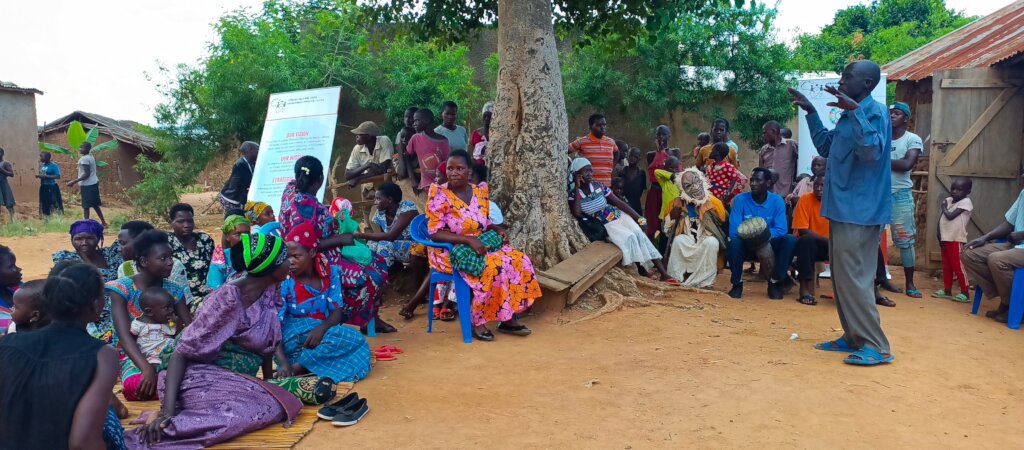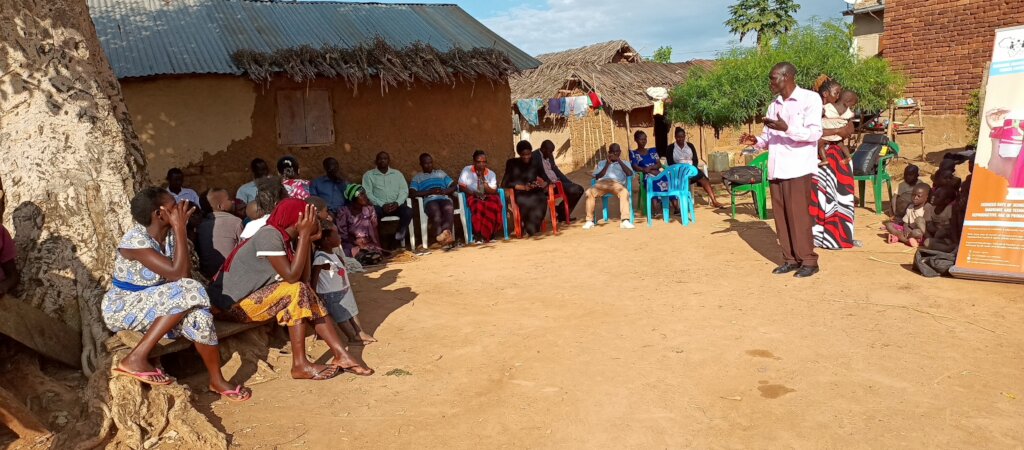![The 3 adolescents reporting to sch with caretakers]()
The 3 adolescents reporting to sch with caretakers
PROGRESS REPORT, NOVEMBER 2022
African Child and Youth Development Initiative (ACYDI)- Uganda partners with the District Local Government to achieve by 2030, the U.N- SDG 3-4 and 5, i.e., Ensuring healthy lives and promote wellbeing for all, inclusive and equitable quality education and promote gender equality, respectively.
Menstrual health management has been reported as one of the leading causes of frequent absenteeism and eventually dropout among schoolgirls in Uganda. From the recent research, Buvuma Islands district is one of the most affected with high levels of child marriage, school dropout, drug abuse and HIV/AIDS among youths especially girls.
The district experienced an overwhelming number of girls who got pregnant during the lockdown while others were experiencing mental health issues due to the increased SGBV cases. Convincing the parents/caretakers that girls who have been home for so long and already either pregnant, having babies or married can return to schools wasn’t easy. When schools opened for Term 1 in January 2022, many girls saw themselves so big and overgrown to repeat classes or even sit in classes hence fearing to go back. The men who already married or impregnated these girls and paid dowery didn’t want them to go to schools yet some girls who wanted to re-unit back with their families were not welcomed by the family especially if they didn’t leave their homes with parent’s consent.
ACYDI therefore partnered with “The Sophie Muwanika Institute of Art” founded and led by Ms. Rashida Namulondo who is an expert trainer in community peace building and self-discovery to encourage the children to get back to school through training them on menstrual health, psycho-social support and community peacebuilding activities.
Actions taken/Activity Implementation Progress.
- Community mobilisation, Mental health, and psycho-social support
ACYDI Carried out an assessment whose results showed that 100% of the 170 out-of-the-school adolescent girls and boys have experienced a mental health issue and self-denial since the lockdown was announced and schools were closed. 33.6% girls had either already given birth or pregnant, staying at their parents’ home or already married off and in their forced marriages compared to the boys where only 13.3% had either or impregnated a girl that is still at their homes or married them and staying together. All the children were counseled, and private psych/mental health support was given to those that needed it and this is an on-going activity. Both the children and interested parents come to the contact persons at ACYDI offices and are provided a safe space for counseling.
- As a result, 3 adolescent children who passed primary seven very well during the 2021 primary leaving examination (2 girls and 1 boy) were supported to join secondary school and provided with all the necessary scholastic materials.
- More vulnerable adolescent girls were supported with scholastic materials including books, pens, mathematical sets, re-usable sanitary pads among others.
- Over 140 adolescent girls & boys and 50 parents across the villages have been privately counseled either through home visits or coming to the safe places at ACYDI office at Buwooya or through school activities and this is an on-going activity.
- All these households where the children come from have also been sensitized and learnt of their roles and responsibilities in educating children and supporting the girls during their menstrual periods.
Challenges
- The rigid cultural traditions and beliefs among the natives of the islands which still takes menstruation as a taboo and doesn’t take education as an important issue for girls. This makes the village penetration process slow as the local village leaders also still believe in menstruation myths.
- There is inconsistent transport system in the isolated islands which limits the team from reaching the deepest villages across the waters where the biggest target population are located. It’s very risky and expensive to cross from one side of the island to the other using canoes and these canoes and small engine boats need to be booked yet some days they never be available thus delaying some activities implementation in those deep village zones of the island.
- Poor, inconsistent network and lack of electricity make communication, coordination and reporting so hard. The whole island depends on private solar systems as there hasn’t been electricity even no hopes for it any soon and yet solar power also depends on the weather for its functioning efficiency. One needs to find a specific spot to get network for both calls and internet or find time to cross to the mainland which makes it expensive.
-
By Robert Kikonyogo, Executive Director
On behalf of African Child and Youth Development Initiative (ACYDI), Uganda.
![Distribution of scholastic materials for learners]()
Distribution of scholastic materials for learners
![The 3 supported adolescents enjoying secondary sch]()
The 3 supported adolescents enjoying secondary sch
![Share on Twitter]()
![Share on Facebook]()

